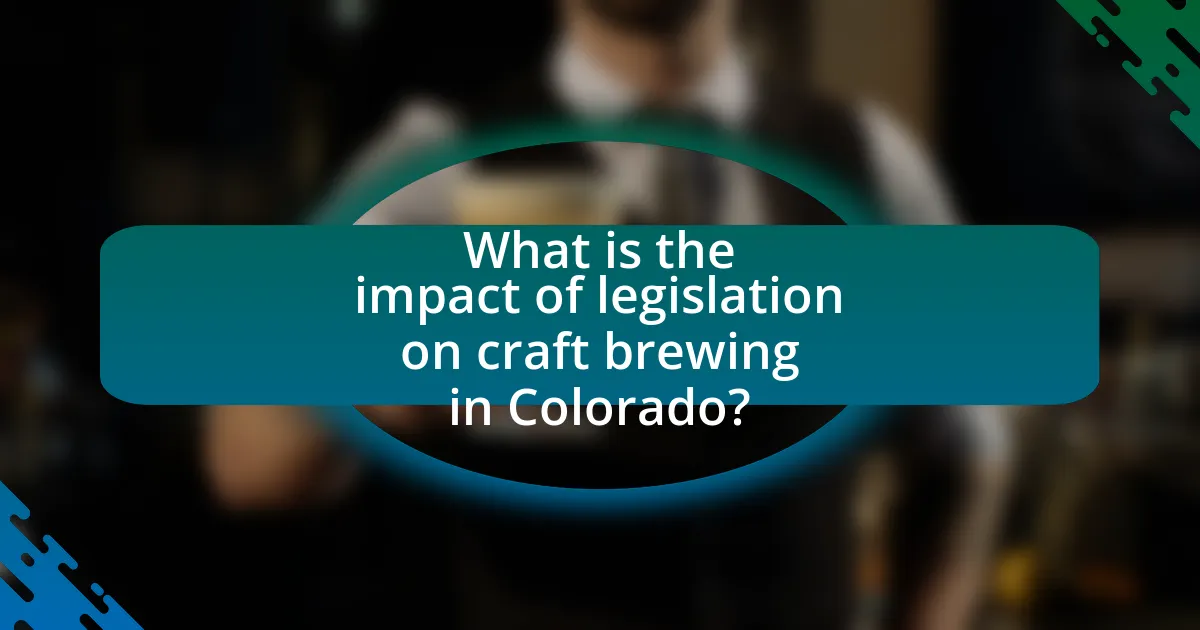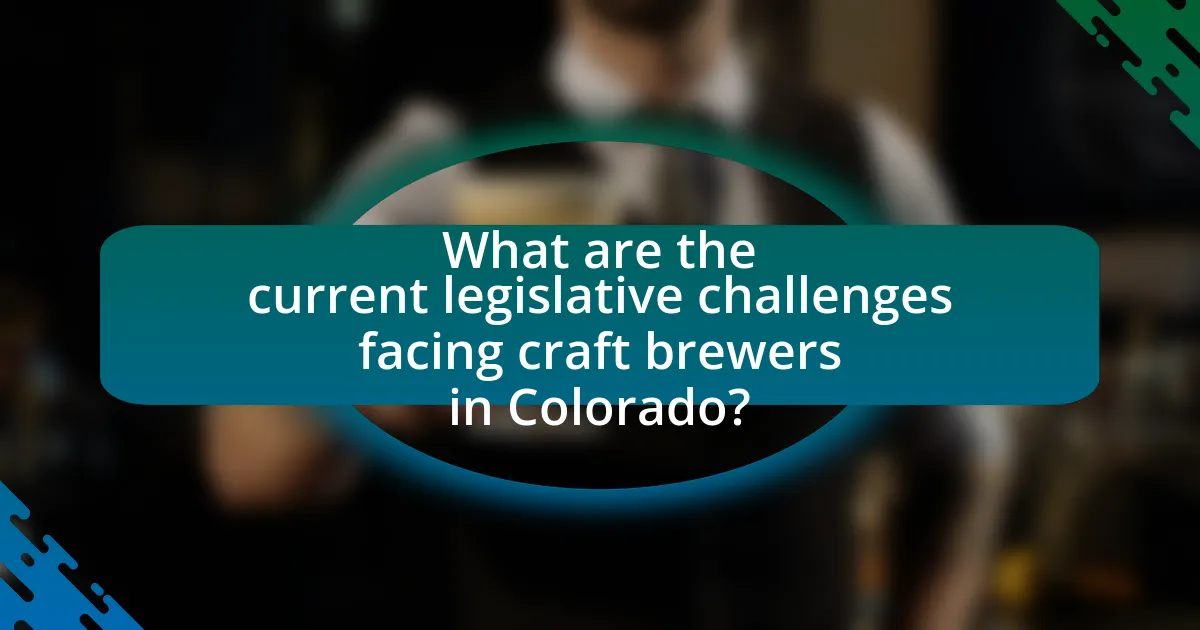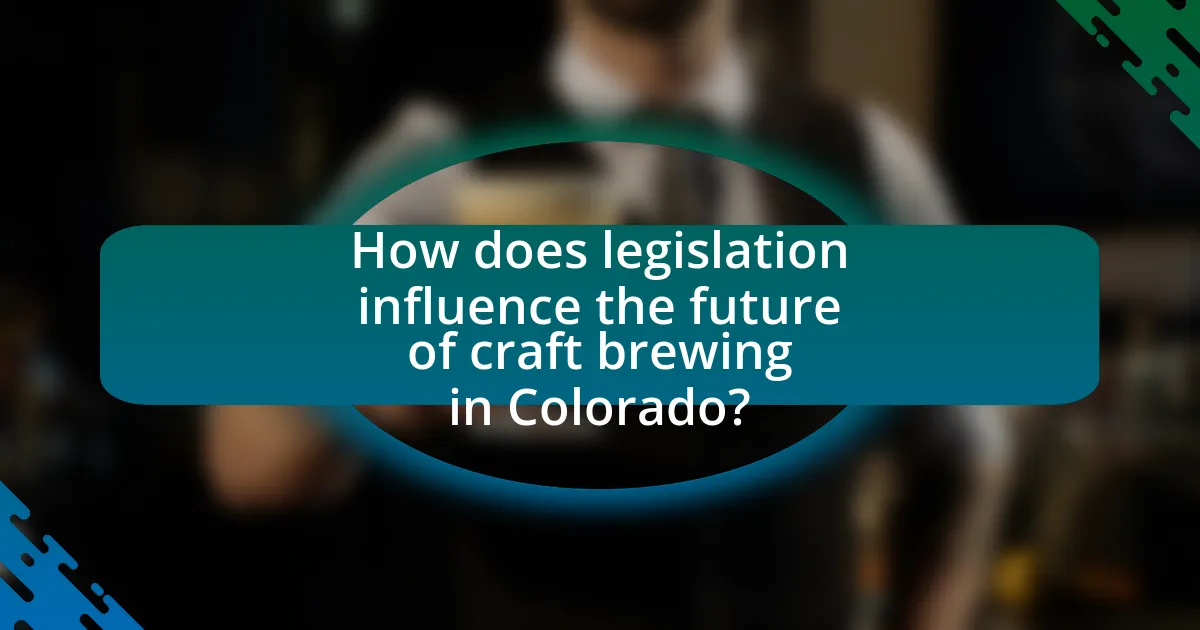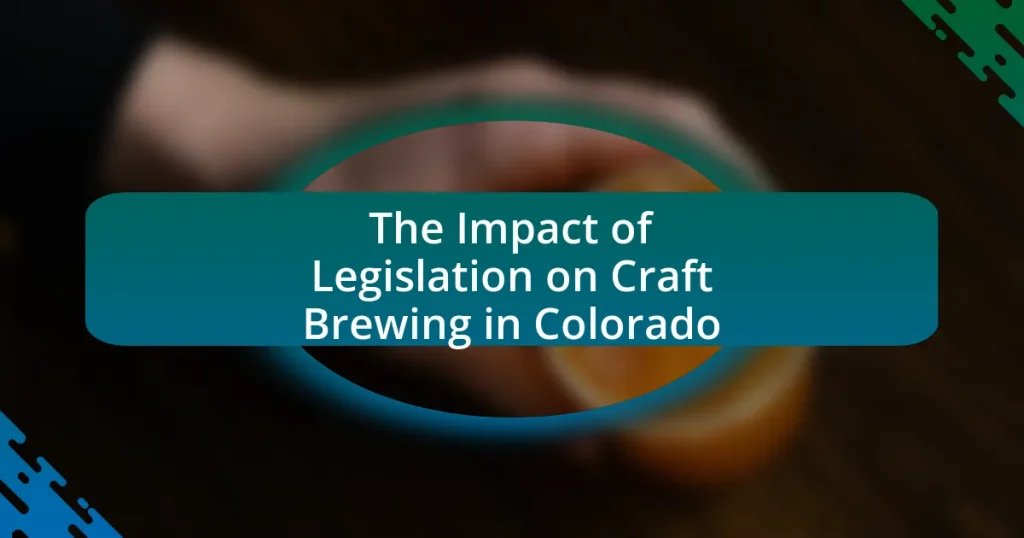The article examines the impact of legislation on craft brewing in Colorado, highlighting how regulatory frameworks influence production, distribution, and sales within the industry. Key laws, such as the Colorado Craft Beer Act, have facilitated market access and contributed to significant growth in the number of craft breweries, which increased from approximately 100 in 2010 to over 400 by 2023. The article also discusses the differences between state and federal regulations, historical legislative milestones, current challenges faced by craft brewers, and the role of advocacy groups in shaping future legislation. Additionally, it outlines best practices for breweries to navigate legislative challenges and stay informed about relevant laws.

What is the impact of legislation on craft brewing in Colorado?
Legislation significantly impacts craft brewing in Colorado by shaping regulatory frameworks that influence production, distribution, and sales. For instance, the Colorado Craft Beer Act, enacted in 2016, allows breweries to sell their products directly to consumers, enhancing market access and promoting local businesses. Additionally, laws governing alcohol content and labeling requirements ensure product safety and consumer awareness, which fosters trust in the craft brewing industry. The state’s supportive legislative environment has contributed to a 20% increase in the number of craft breweries from 2019 to 2022, demonstrating the positive correlation between favorable legislation and industry growth.
How has legislation shaped the craft brewing landscape in Colorado?
Legislation has significantly shaped the craft brewing landscape in Colorado by creating a favorable regulatory environment that encourages growth and innovation. The introduction of the Colorado Craft Beer Act in 2010, which allowed breweries to sell beer directly to consumers and expanded the hours for alcohol sales, has facilitated increased access to craft beer and stimulated local economies. Additionally, the state’s progressive stance on alcohol laws, including the legalization of brewpubs and the reduction of licensing fees, has led to a surge in the number of craft breweries, which grew from approximately 100 in 2010 to over 400 by 2023. This legislative support has not only fostered a vibrant craft beer culture but has also positioned Colorado as a leader in the craft brewing industry nationally.
What key laws have influenced the growth of craft breweries in Colorado?
The key laws that have influenced the growth of craft breweries in Colorado include the Colorado Liquor Code, which was amended in 2012 to allow breweries to sell their products directly to consumers, and the 2016 law that permitted breweries to sell beer for off-premises consumption. These legislative changes have significantly expanded market access for craft breweries, enabling them to thrive in a competitive environment. The 2012 amendment specifically allowed for the sale of beer in larger quantities, which helped increase revenue streams for breweries, while the 2016 law facilitated greater consumer convenience and choice, further promoting the craft beer industry in Colorado.
How do state regulations differ from federal regulations affecting craft brewing?
State regulations affecting craft brewing often provide more specific guidelines and requirements than federal regulations, which are broader and more general. For example, while federal regulations set the minimum legal drinking age and establish basic labeling requirements, state regulations can dictate additional aspects such as local licensing, production limits, and distribution rules. In Colorado, state laws allow for unique practices like self-distribution for small breweries, which is not addressed at the federal level. This distinction highlights how state regulations can create a more tailored regulatory environment that reflects local market conditions and community preferences.
What are the historical contexts of craft brewing legislation in Colorado?
Craft brewing legislation in Colorado has evolved significantly since the repeal of Prohibition in 1933, which marked the beginning of legal brewing in the state. The establishment of the Colorado Craft Brewers Guild in 1998 played a crucial role in advocating for favorable legislation, leading to the passage of laws that reduced licensing fees and simplified the regulatory process for small breweries. In 2012, Colorado became the first state to allow breweries to sell beer for off-premises consumption, further promoting craft beer culture. By 2020, Colorado had over 400 craft breweries, reflecting the positive impact of legislative changes on the industry. These historical contexts demonstrate how legislative efforts have shaped the growth and success of craft brewing in Colorado.
What significant milestones in legislation have impacted craft brewing?
The significant milestones in legislation that have impacted craft brewing include the legalization of brewpubs in Colorado in 1988, which allowed breweries to sell their products on-site, and the passing of the Colorado Craft Beer Act in 2015, which streamlined regulations for small breweries. The 1988 legislation marked a pivotal moment by enabling the establishment of brewpubs, leading to a surge in local craft beer production. The 2015 Act further supported the craft brewing industry by reducing licensing fees and simplifying the process for breweries to operate, contributing to the growth of over 400 craft breweries in Colorado by 2023.
How have changes in legislation reflected societal attitudes towards craft beer?
Changes in legislation have increasingly reflected a positive societal attitude towards craft beer, as evidenced by the relaxation of regulations and the promotion of local breweries. For instance, the introduction of the Colorado Craft Beer Act in 2010 allowed breweries to sell beer directly to consumers, which demonstrated a growing acceptance and support for craft beer culture. Additionally, the increase in the number of craft breweries in Colorado, from around 100 in 2010 to over 400 by 2023, indicates a shift in consumer preferences towards locally produced, artisanal products. This legislative support aligns with the public’s desire for diversity in beer options and a preference for supporting local businesses, showcasing how changes in laws have mirrored evolving societal values regarding craft beer.

What are the current legislative challenges facing craft brewers in Colorado?
Current legislative challenges facing craft brewers in Colorado include restrictions on distribution, taxation issues, and regulatory compliance burdens. Specifically, craft brewers face difficulties with laws that limit their ability to self-distribute, which can hinder their market access compared to larger breweries. Additionally, the state imposes high excise taxes on beer production, impacting profitability. Regulatory compliance, including health and safety regulations, can also be complex and costly for smaller operations. These challenges are compounded by ongoing legislative debates that may alter existing laws, creating uncertainty in the industry.
How do taxation policies affect craft breweries in Colorado?
Taxation policies significantly impact craft breweries in Colorado by influencing their operational costs and pricing strategies. Specifically, the state imposes excise taxes on beer production, which can affect profit margins; for instance, Colorado’s excise tax on beer is $0.08 per gallon, one of the lower rates in the U.S., allowing breweries to maintain competitive pricing. Additionally, sales tax on retail sales can further affect consumer pricing and demand. The overall tax structure can either encourage growth by providing a favorable environment or hinder it by increasing financial burdens, as seen in states with higher tax rates that struggle to support local breweries.
What are the specific tax rates imposed on craft breweries?
Craft breweries in Colorado are subject to a federal excise tax rate of $3.50 per barrel for the first 60,000 barrels produced annually. This rate applies to small brewers producing fewer than 2 million barrels. Additionally, Colorado imposes a state sales tax of 2.9% on the sale of beer, with local jurisdictions potentially adding their own sales taxes, which can vary. The combination of these federal and state tax rates significantly impacts the financial landscape for craft breweries in the state.
How do these tax policies compare to those in other states?
Colorado’s tax policies for craft brewing are generally more favorable compared to many other states, particularly in terms of excise tax rates. For instance, Colorado imposes a $0.08 per gallon excise tax on beer, which is lower than the national average of approximately $0.16 per gallon. Additionally, states like California and New York have higher excise taxes, at $0.20 and $0.14 per gallon respectively. This lower tax burden in Colorado supports the growth of the craft brewing industry, contributing to its status as one of the leading states for craft breweries, with over 400 breweries operating as of 2023.
What licensing requirements must craft brewers meet in Colorado?
Craft brewers in Colorado must obtain a series of licenses to operate legally, including a federal brewer’s notice from the Alcohol and Tobacco Tax and Trade Bureau (TTB), a state license from the Colorado Department of Revenue’s Liquor Enforcement Division, and a local license from the city or county where the brewery is located. The federal license ensures compliance with national regulations, while the state and local licenses address specific Colorado laws regarding alcohol production and sales. Additionally, brewers must adhere to zoning regulations and health department requirements, which further govern their operations.
What are the steps involved in obtaining a brewing license?
To obtain a brewing license, an applicant must follow several key steps. First, the applicant needs to determine the type of brewing license required, which can vary based on the scale and type of brewing operation, such as a microbrewery or brewpub. Next, the applicant must complete the necessary application forms provided by the Alcohol and Tobacco Tax and Trade Bureau (TTB) and the state’s liquor control agency, which in Colorado is the Colorado Department of Revenue.
After submitting the application, the applicant must pay the required fees and undergo a background check. Following this, the applicant must provide detailed information about the brewing facility, including floor plans and equipment specifications. The local government may also require a zoning permit to ensure compliance with local regulations.
Once all documentation is submitted, the TTB and state agency will review the application, which may involve inspections of the brewing facility. If approved, the applicant will receive the brewing license, allowing them to legally produce and sell beer. This process can take several months, depending on the complexity of the application and local regulations.
How do local ordinances impact the licensing process for craft breweries?
Local ordinances significantly influence the licensing process for craft breweries by establishing specific regulations that must be adhered to for obtaining permits. These regulations can include zoning laws, health and safety codes, and operational restrictions that vary by municipality. For instance, in Colorado, local governments have the authority to dictate where breweries can operate, which can affect the availability of suitable locations for new establishments. Additionally, local ordinances may impose requirements for public hearings or community approvals, further complicating the licensing process. This localized control can lead to disparities in the ease of obtaining licenses across different areas, impacting the growth and sustainability of craft breweries within the state.

How does legislation influence the future of craft brewing in Colorado?
Legislation significantly influences the future of craft brewing in Colorado by shaping regulatory frameworks that affect production, distribution, and sales. For instance, laws governing alcohol content, licensing requirements, and distribution channels directly impact how craft breweries operate and grow. In 2021, Colorado passed legislation allowing breweries to sell directly to consumers through online platforms, which expanded market access and increased sales opportunities. Additionally, tax incentives for small breweries can encourage new startups and innovation within the industry. These legislative measures create an environment that can either foster growth or impose restrictions, ultimately determining the sustainability and expansion of craft brewing in the state.
What potential legislative changes could affect craft breweries in the coming years?
Potential legislative changes that could affect craft breweries in the coming years include modifications to alcohol distribution laws, tax incentives for small breweries, and regulations surrounding labeling and marketing. For instance, recent trends indicate that states are considering legislation to allow direct-to-consumer sales, which could enhance market access for craft breweries. Additionally, tax reforms aimed at reducing excise taxes for small producers have been proposed, reflecting a growing recognition of the economic contributions of craft breweries. These changes are supported by data showing that craft breweries contribute significantly to local economies, with the Brewers Association reporting that the craft brewing industry generated over $82 billion in economic impact in 2022.
How might proposed laws impact the growth of new breweries?
Proposed laws can significantly impact the growth of new breweries by either facilitating or hindering their establishment and operation. For instance, legislation that reduces licensing fees and streamlines the application process can encourage more entrepreneurs to enter the craft brewing market. According to the Brewers Association, states with favorable regulatory environments, such as lower taxes and fewer restrictions, have seen a higher number of new breweries open. Conversely, laws that impose stringent regulations on production limits or distribution can create barriers, discouraging potential brewers from starting their businesses. In Colorado, recent legislative efforts aimed at supporting small breweries have contributed to a notable increase in the number of craft breweries, highlighting the direct correlation between supportive laws and industry growth.
What role do advocacy groups play in shaping future legislation?
Advocacy groups play a crucial role in shaping future legislation by mobilizing public opinion, influencing policymakers, and providing expertise on specific issues. These organizations often represent the interests of particular sectors, such as craft brewing, and actively engage in lobbying efforts to promote favorable laws and regulations. For instance, in Colorado, advocacy groups like the Colorado Brewers Guild have successfully lobbied for legislation that supports craft breweries, such as reduced taxes and regulatory reforms, which have contributed to the growth of the industry. Their efforts are backed by data showing that craft breweries significantly boost local economies, creating jobs and generating tax revenue, thereby reinforcing the importance of their advocacy in legislative processes.
What best practices can craft brewers adopt to navigate legislative challenges?
Craft brewers can adopt proactive engagement with local legislators as a best practice to navigate legislative challenges. By establishing relationships with lawmakers, brewers can advocate for favorable policies and stay informed about upcoming legislation that may impact their operations. For instance, the Colorado Brewers Guild actively collaborates with state legislators to influence laws affecting the craft brewing industry, demonstrating the effectiveness of such engagement. Additionally, participating in industry associations provides brewers with resources and collective lobbying power, which can lead to more favorable legislative outcomes.
How can breweries effectively engage with lawmakers?
Breweries can effectively engage with lawmakers by establishing direct communication channels and participating in advocacy efforts. By organizing meetings with legislators, breweries can present their concerns and interests regarding legislation that affects the craft brewing industry. Additionally, joining industry associations, such as the Colorado Brewers Guild, allows breweries to collaborate on collective lobbying efforts, amplifying their voice. Engaging in public forums and providing data on the economic impact of craft brewing, such as job creation and tax revenue, further strengthens their position. For instance, a report from the Brewers Association indicates that the craft brewing industry contributed over $82 billion to the U.S. economy in 2019, highlighting its significance to lawmakers.
What resources are available for craft brewers to stay informed about legislation?
Craft brewers can stay informed about legislation through several key resources, including industry associations, government websites, and legal newsletters. The Brewers Association, for example, provides updates on federal and state legislation affecting the brewing industry, while the Colorado Department of Revenue offers information on state-specific regulations. Additionally, legal firms specializing in alcohol law often publish newsletters and blogs that cover relevant legislative changes. These resources ensure that craft brewers have access to timely and accurate information regarding the legal landscape impacting their operations.


